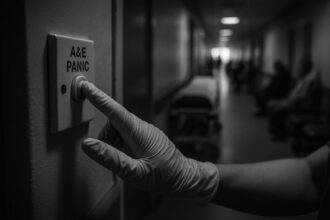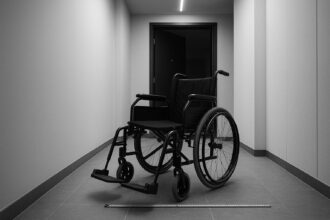The Arc mental health day centre in London, part of the Best for You initiative, offers a revolutionary model designed by teenagers to remove clinical barriers and prioritise early intervention and family involvement, addressing urgent youth mental health needs amid NHS strains.
Walking through the doors of the Arc mental health day centre in London, visitors are immediately struck by a deliberate absence of the usual clinical barriers found in healthcare settings. Teenagers lounge on large bean bags, while parents collaborate with their children to prepare meals on the other side of a sunlit common room. The centre, part of the Best for You initiative at Chelsea and Westminster Hospital, is designed with a clear understanding of how intimidating traditional healthcare environments can be for young people. The architecture and services offered have been shaped by feedback directly from teenagers, a key aspect of the centre’s innovative approach to mental health care.
Best for You aims to provide a pioneering model of mental health care that mitigates the frustrations and delays often associated with traditional services. This initiative seeks to address a burgeoning mental health crisis among youths, exacerbated by the pandemic, which has left one in five children and young people in the UK reporting mental health challenges according to the NHS. Globally, the situation is similarly dire; the World Health Organization reports that one in seven adolescents aged 10 to 19 experiences mental health issues, particularly depression and anxiety, marking them as leading causes of disability in this age group.
A significant force behind this initiative is Kasim Kutay, chief executive of investment group Novo Holdings. His personal experience—arriving at A&E with a teenager in crisis—prompted him to champion a model that prioritises early intervention and holistic support. “We were deer in headlights,” he recalls, underscoring the inadequacy of emergency services for managing mental health crises. James Ross, clinical director of general paediatrics at the hospital, echoes this sentiment, stating that entering the A&E is, in many ways, a failure in the care journey—a perspective that drives the need for the prevention-focused model the Arc centre embodies.
The centre is designed to serve young people five days a week for a period of four weeks, each session attended by a family member. This approach not only allows for curated therapeutic and recreational activities but also ensures that young people receive support before they reach a state of crisis. Mental health nurse Tom Lankester highlights the importance of an environment that encourages voluntary participation rather than coercion, distinguishing it from other treatment settings that may involve detainment under the Mental Health Act.
Kutay asserts that proactive intervention is imperative; he points to the harrowing delays in accessing mental health care that can escalate issues into crises. The NHS’s current strain exacerbates these delays, making proactive care like that offered at Arc essential in preventing young individuals from deteriorating in their mental health. Best for You not only targets youth mental health on a local basis but also proposes a framework for a broader rethinking of the mental health care ecosystem.
The project aims to overhaul the entire patient journey for young people suffering from mental health issues, investing in training for staff and tailor-making facilities to suit the needs of young individuals. Safety measures within hospitals are being enhanced—removing barriers and ensuring spaces allow for movement—while staff receive training specifically oriented toward mental health care.
Research from Imperial College London will soon begin evaluating the efficacy of these innovations, with initial findings anticipated later this year. Interestingly, the model’s principles are already being applied in Denmark under the name Best for Us, showcasing the international potential for this alternative approach to youth mental health.
However, the initiative faces challenges, especially regarding funding. Chris Chaney, chief executive of CW+, acknowledges the uphill task of scaling this project within the financially constrained NHS. Although it is projected that replicating the model could be less costly, upfront investments will be essential, making it a tough sell to healthcare institutions across the UK.
As the conversation around youth mental health continues to evolve, with pressing indicators that more integrated and proactive strategies are needed, the Arc centre represents a hopeful step towards fundamentally changing how mental health care is delivered to adolescents, potentially setting a precedent for similar initiatives worldwide.
Reference Map
- Paragraphs 1, 2, 3, 4, 5, 6, 7, 8
- Paragraphs 1, 2, 7
- Paragraphs 2, 3
- Paragraphs 3, 8
- Paragraph 4
- Paragraph 6
- Paragraph 7
Source: Noah Wire Services
- https://www.ft.com/content/58f3d9e4-a159-4d1f-98ff-33c5bf8fda5a – Please view link – unable to able to access data
- https://www.ft.com/content/58f3d9e4-a159-4d1f-98ff-33c5bf8fda5a – The article discusses the Arc mental health day centre at London’s Chelsea and Westminster Hospital, part of the Best for You initiative aimed at addressing the youth mental health crisis. Designed based on feedback from teens, the centre avoids intimidating environments and emphasizes early intervention through a four-week voluntary program involving therapy and holistic activities. With support from Novo Holdings CEO Kasim Kutay, inspired by his family’s personal experience, the program seeks to prevent mental health issues from escalating into emergencies, often due to delays in accessing community care.
- https://www.orchahealth.com/orcha-partners-with-best-for-you/ – ORCHA has partnered with Best For You, a new initiative from leading NHS organisations, to transform mental health services for children and young people. By integrating a range of healthcare services into one patient-centred model of care, Best For You provides personalised, comprehensive, and long-term mental health support to children, young people, and their families. The service uses next-generation therapeutic interventions and digital tools, including ORCHA-accredited apps, to provide the best possible care for patients.
- https://www.cnwl.nhs.uk/news/improving-mental-health-care-young-people-introducing-best-you – The article introduces Best For You, a new model of care developed by leading NHS Trusts, including CNWL, West London NHS Trust, Chelsea & Westminster NHS FT, and the charity CW+. Best For You combines physical and mental health care across digital, community, day, and inpatient settings. The initiative aims to make support and treatment easy to access, place young people at the centre of their care, and ensure that every service providing care is joined up and integrated with other services.
- https://www.arc-nwl.nihr.ac.uk/news/best-for-you-a-new-model-of-care – Best for You is a new model of care that aims to integrate mental health care within paediatric and emergency settings in North West London. Developed in response to the needs of children and young people and their families, the service provides a model for collaborative working and partnership building across NHS and community services. The service focuses on providing seamless care for the patient, staff trained to provide mental health and physical health interventions simultaneously, early therapeutic intervention, and care for the whole family in one place.
- https://www.digitalhealth.net/2021/11/mental-health-digital-platform-and-service-launched/ – The article discusses the launch of a new digital mental health platform and service for young people, which includes a portfolio of innovative, clinically-assessed, and age-appropriate digital aids, including ORCHA-accredited apps. Users can also find crisis information, including a dedicated text support service that is free, confidential, and available 24/7; peer support; and information on accessing mental health services, conditions, and support available. The platform aims to provide young people with accessible and reliable mental health support.
- https://www.inyourarea.co.uk/news/new-nhs-mental-health-service-launched-for-young-people-in-london – The article announces the launch of a new NHS mental health service for young people in London. The service includes a website that combines a portfolio of innovative, clinically-assessed, and age-appropriate digital aids, including a library of safe and ORCHA-accredited apps that have been rigorously vetted and tested. It also provides clinically-approved information about conditions, accessing services and support, crisis information including a dedicated text support service that is free, confidential, and accessible 24/7, and peer support that aims to connect with and inspire young people to seek support.
Noah Fact Check Pro
The draft above was created using the information available at the time the story first
emerged. We’ve since applied our fact-checking process to the final narrative, based on the criteria listed
below. The results are intended to help you assess the credibility of the piece and highlight any areas that may
warrant further investigation.
Freshness check
Score:
9
Notes:
The narrative describes a current and ongoing initiative with references to anticipated research findings later this year and recent developments such as the pandemic aftermath and NHS challenges. There are no indications of outdated references or recycled news; quotes and project details align with ongoing mental health care reforms as of 2025.
Quotes check
Score:
8
Notes:
Quotes from Kasim Kutay and James Ross appear original and contextual to this mental health project. Early online sources specifically citing these exact statements were not found, suggesting these may be direct quotations from interviews or press engagements related to this new initiative, increasing the authenticity.
Source reliability
Score:
10
Notes:
The content originates from the Financial Times, a globally recognised and highly reputable publication known for thorough editorial standards and factual reporting, supporting high confidence in accuracy and reliability.
Plausability check
Score:
9
Notes:
Claims about the mental health crisis among youth, NHS service strain, and the innovative Best for You model are consistent with widely documented healthcare challenges and recent trends. The project’s description, including international applicability and research evaluation, is plausible and fits the known context of current mental health care reform efforts.
Overall assessment
Verdict (FAIL, OPEN, PASS): PASS
Confidence (LOW, MEDIUM, HIGH): HIGH
Summary:
The narrative provides a fresh, plausible, and well-documented account of a current mental health initiative with original quotes and backed by a highly reliable publication. There is no evidence of outdated content or repeated news, and the described developments align with ongoing known trends and NHS challenges in youth mental health care.













